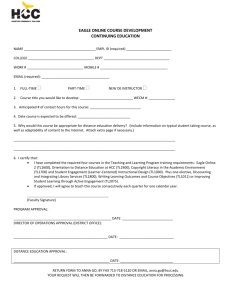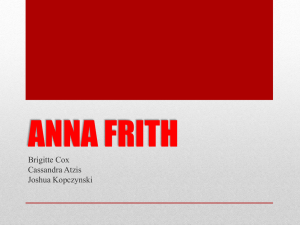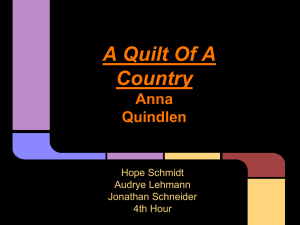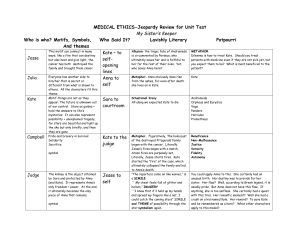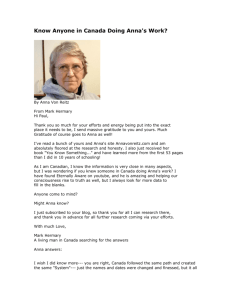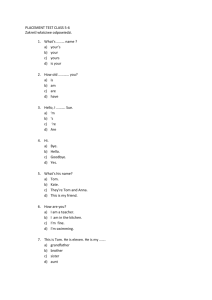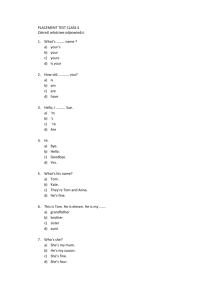Ethics- put basically, is it moral to do this? - Mrs
advertisement
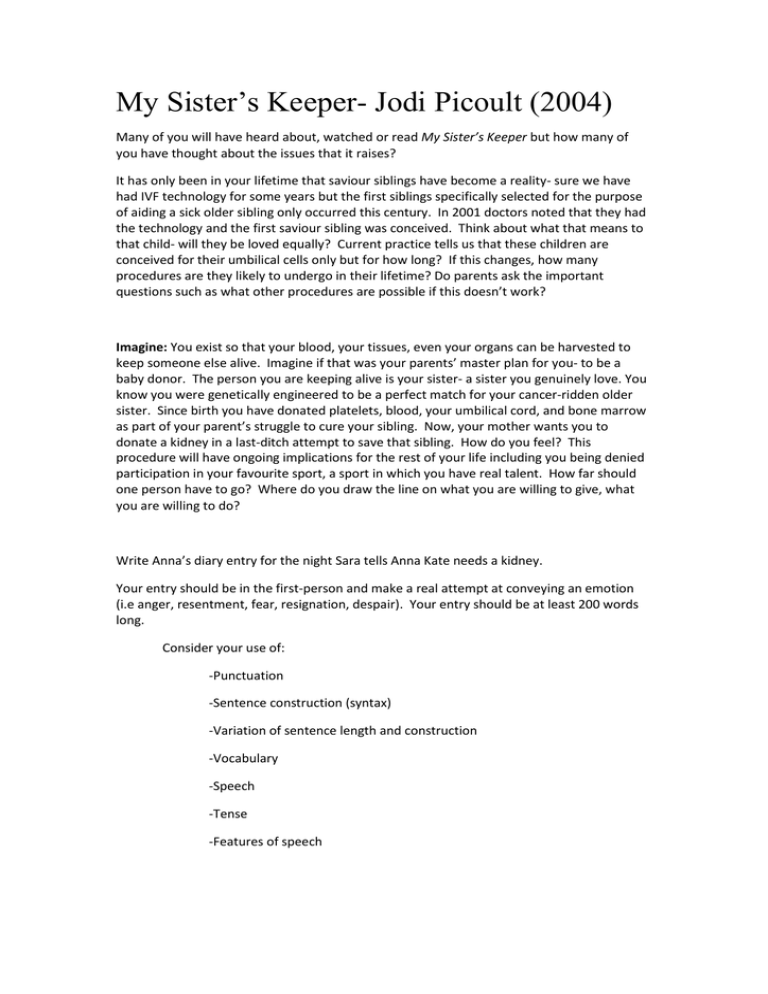
My Sister’s Keeper- Jodi Picoult (2004) Many of you will have heard about, watched or read My Sister’s Keeper but how many of you have thought about the issues that it raises? It has only been in your lifetime that saviour siblings have become a reality- sure we have had IVF technology for some years but the first siblings specifically selected for the purpose of aiding a sick older sibling only occurred this century. In 2001 doctors noted that they had the technology and the first saviour sibling was conceived. Think about what that means to that child- will they be loved equally? Current practice tells us that these children are conceived for their umbilical cells only but for how long? If this changes, how many procedures are they likely to undergo in their lifetime? Do parents ask the important questions such as what other procedures are possible if this doesn’t work? Imagine: You exist so that your blood, your tissues, even your organs can be harvested to keep someone else alive. Imagine if that was your parents’ master plan for you- to be a baby donor. The person you are keeping alive is your sister- a sister you genuinely love. You know you were genetically engineered to be a perfect match for your cancer-ridden older sister. Since birth you have donated platelets, blood, your umbilical cord, and bone marrow as part of your parent’s struggle to cure your sibling. Now, your mother wants you to donate a kidney in a last-ditch attempt to save that sibling. How do you feel? This procedure will have ongoing implications for the rest of your life including you being denied participation in your favourite sport, a sport in which you have real talent. How far should one person have to go? Where do you draw the line on what you are willing to give, what you are willing to do? Write Anna’s diary entry for the night Sara tells Anna Kate needs a kidney. Your entry should be in the first-person and make a real attempt at conveying an emotion (i.e anger, resentment, fear, resignation, despair). Your entry should be at least 200 words long. Consider your use of: -Punctuation -Sentence construction (syntax) -Variation of sentence length and construction -Vocabulary -Speech -Tense -Features of speech That’s what Anna’s life is like. Anna was genetically engineered to be a perfect match for her cancer-ridden older sister. Since birth Anna has donated platelets, blood, her umbilical cord, and bone marrow as part of her family’s struggle to cure Kate. Now, her mother wants her to donate a kidney in a last-ditch attempt to save her 16-year-old sister. Anna’s parents do love her- but to Sara, her mother, at least the bottom line is that she was created to be Kate’s saviour. Anna loves her parents but, understandably, she is having difficulty feeling good about fulfilling Sara’s expectation. She is tired of the procedures, of the pain, of her life being put on hold. But above all Anna loves Kate. She wants her sister to be around forever; she wants to grow up with her. But is that even a possibility? How far should one person have to go? Where do you draw the line on what you are willing to give, what you are willing to do? Consider Anna’s story: Because Kate, 16, suffers from Acute Promyelocytic Leukemia (APL)a rare and aggressive form of cancer and is dying, Anna, 13, was born to be her ‘saviour’. Anna is a human leukocyte antigen (HLA) matched donor for Kate (in real cases it is only umbilical cord blood that has been donated, Picoult’s novel imagines a time where more could be demanded of these children). Readers learn that Kate did receive a transfusion of cells from Anna’s umbilical cord blood. This blood was intended to repopulate Kate’s bone marrow and cure her cancer. Apparently the treatment did work, but only temporarily. Kate suffers a relapse and Anna is used for compatible platelets and then her bone marrow, each treatment results in some improvement in Kate’s condition. The need for ongoing treatment sees both Kate and Anna locked into a seemingly endless cycle of, not only, operations and hospital visits, but also responsibility, guilt, love and resentment. As readers, we hear of the numerous procedures Anna endures as a result of her unchosen role as Kate’s saviour. This culminates in the prospect of kidney donation. Faced with this Anna hires a lawyer, Campbell, and takes her parents to court to “petition for medical emancipation.” We follow Anna and her family as the action is filed, the hearing is held and an outcome is reached throughout which Anna struggles for the right to refuse the ‘donation’ knowing that should she achieve the desired outcome the result is Kate’s death. Picoult uses the novel to explore what she imagines could be some of the social, psychological, emotional and legal implications for ‘saviour babies’, particularly if they were to be conceived for illnesses that demand ongoing treatments to lengthen the life of the sufferer. Ethics- put basically, is it moral to do this? Anna is not sick, but she might as well be. By age thirteen, she has undergone countless surgeries, transfusions, and shots so that her older sister, Kate, can somehow fight the leukemia that has plagued her since childhood. Anna’s role in life has not changed and until now she has never challenged it. Like most teenagers, Anna is beginning to question who she truly is. But unlike most teenagers, she has always been defined in terms of her sister. My Sister’s Keeper examines what it means to be a good parent, a good sister, a good person. Is it morally correct to do whatever it takes to save a child’s life, even if it means infringing upon the rights of another? As Optimus Prime says in Transformers 3: “ The needs of the many outweigh the needs of the few.”TIs it o.k. to sacrifice many to save the one? Is it o.k. to sacrifice Anna and Jesse for Kate? Is it worth trying to discover who you really are, if that quest makes you like yourself less? Below are some of the ethical concerns that surround the creation of ‘saviour siblings’: Consent: As Anna meets Campbell on pages 20-22 readers are shown how consent is currently handled for minors for the purpose of non-therapeutic medical treatment (e.g. bone marrow or blood donation). Pages 292-298: During the court case Campbell tries to establish a better definition of consent. The Judge, and readers, are asked to listen to the treatments Anna has endured and note each time that the pain endured by Anna is barely, if at all a consideration- the end goal is always saving Kate. Is Anna considered as a person? A child? Something other than a convenient donor, a saviour? -How old do you think we need to be to give our consent? -Should Anna have been asked whether she was willing? When? At what age? Or, should she simply be happy to do it as it is the reason she is alive in the first place? -Look at the language used in each report- how are they different? Give evidence. -What emotion(s) is being conveyed in each account? How is this achieved? Give evidence. The instrumentalisation of the child: Pages 26 and 27 and again in pages 64 and 65 readers are shown the Fitzgeralds as a complete family with Anna as an addition only to save Kate while those on pages 53 and 54, 196 and 197 and 404 to 407 show us that Anna is loved. Pages 26 and 27 establish the dynamics of the Fitzgerald family before they are given the news of Kate’s cancer. Do they seem happy? Typical? Look at the language that characterises the relationship between Sara and Brian- are they happy? Contrast this language with an event later in the novel- has the language that describes the marriage changed? Are they comfortable? Happy? How has the relationship changed? Give examples. Pages 64 and 65 show the moment when Sara had to change her concept of her familysuddenly she is having to consider another child- is she pleased about it? How does this make you view her actions in agreeing to have a donor child and conceiving Anna? Is Anna a wanted child? For the ‘right’ reasons? On pages 53 and 54 Sara and Brian have received notification of Anna’s emancipation suit. What emotions are being conveyed? How? Is Anna being held at an equal level to Kate by Sara? Give evidence. Why does Anna feel shame? Does Brian see his daughters as equal? How do we know this? Pages 196 and 197 give us the opportunity to see Brian putting Anna first but also how Anna is coping with Kate’s illness and the court case. Is Sara being fair? Is her response justified? Why or why not? How does Brian and Sara’s marriage seem? Do you think one is being a better parent than the other? Why? Pages 404 to 407 is Sara’s impassioned plea to the court and more importantly to Anna. How does this speech make you feel about Sara? Do you see the situation differently? Why or why not? Does it change you opinion on whether Sara is a good parent? The welfare and best interest of the ‘saviour child’: When we consider whether the creation of a ‘saviour baby’ is ethical we have to think about the long-term effects on the child to be conceived. Is Anna a valued, loved member of her family? Is being a donor for Kate in Anna’s best interest? Pages 294 to 298 illustrate how the donation of umbilical cord blood may turn into a succession of more invasive and therefore more ethically problematic donations, also how, in practice, the best interests of the saviour sibling may be balanced against those of the child to be saved. Once you have read the entire novel: Are the actions that Sara takes throughout Kate’s and Anna’s lives in the best interests of her daughters? Consider the real reason for Anna’s lawsuit. While there are no recorded cases in which children have had to endure what Anna has as a ‘saviour sibling’ do you think that this could be a possibility? Do you think that there needs to be some sort of data kept that tracks these children to ensure that in the case of the older sibling becoming ill again that the ‘saviour’ is fairly treated/represented? The long-term experience of the child: The opening pages of the novel and pages 87-89 depict Anna’s experience of being a ‘saviour sibling’ and how that knowledge has become a part of her identity. Anna has a conversation with the judge about the issue of consent. The judge states that she can certainly make her unwillingness known and that nobody would take a kidney from an unwilling donor but Anna’s experience is different- how and why? Find another example of Anna’s experience as an unwilling donor.
